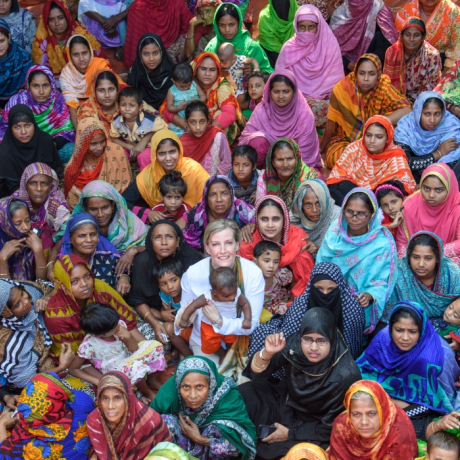The Countess of Wessex, who is a Global Ambassador of the International Association for the Prevention of Blindness, has been in Bangladesh to visit projects and organisations working to eradicate avoidable blindness.
On arrival in Bangladesh, Her Royal Highness was welcomed by the Prime Minister of Bangladesh, Sheikh Hasina, at her official Residence, Gana Bhaban.
The Countess then visited Ispahani Islamic Eye Institute and Hospital, which is supported by the charity Orbis.
Orbis is a global charity that brings people together to fight avoidable blindness by training eye teams, strengthening eye health systems and working on the ground to provide lasting solutions to communities in need.
Her Royal Highness officially opened the hospital's 'wet lab' – a training facility that enables ophthalmologists to practise techniques before performing surgery on patients.
At BRAC, which is the world's largest NGO, The Countess was shown a demonstration of the work of a community worker and met a number of staff.
On day two of her visit to Bangladesh, The Countess visited Barisal to see how The Queen Elizabeth Diamond Jubilee Trust is supporting projects to help the problem of blindness caused by diabetes.
Her Royal Highness is Vice Patron of the Jubilee Trust, a charity that was established in 2012 to mark The Queen's sixty-year contribution to the Commonwealth.
Its mission is to enrich the lives of people from all backgrounds, within the Commonwealth, by working with partners towards eliminating avoidable blindness and empowering a new generation of young leaders.
The Countess then visited two rural community awareness programmes, which work with the local population to prevent diabetic retinopathy.
The final day in Bangladesh started with a service of remembrance at Chittagong War Cemetery, which contains the graves of over 750 servicemen and women from the United Kingdom, India, Canada and West Africa.
At Chittagong Eye Infirmary and Training Complex, Her Royal Highness met patients who were operated on by staff who have been trained and supported by Orbis.
Orbis has also set up a new hospital library, which allows doctors and other medical staff to have a continuous learning facility where they can study new techniques and research.
The Countess also visited the Asian University for Women, which was opened in 2008 and so far has provided nearly 550 women with a quality education, many of whom are former garment factory workers or refugees.
Finally, Her Royal Highness visited Orbis's Flying Eye Hospital (FEH) – a converted MD10 aeroplane that provides training and medical care for locals.
Avoidable blindness is a cause close to The Countess's heart, earlier in the year she visited Malawi to see work being done there. She also wrote a blog for the Huffington Post on the subject.



